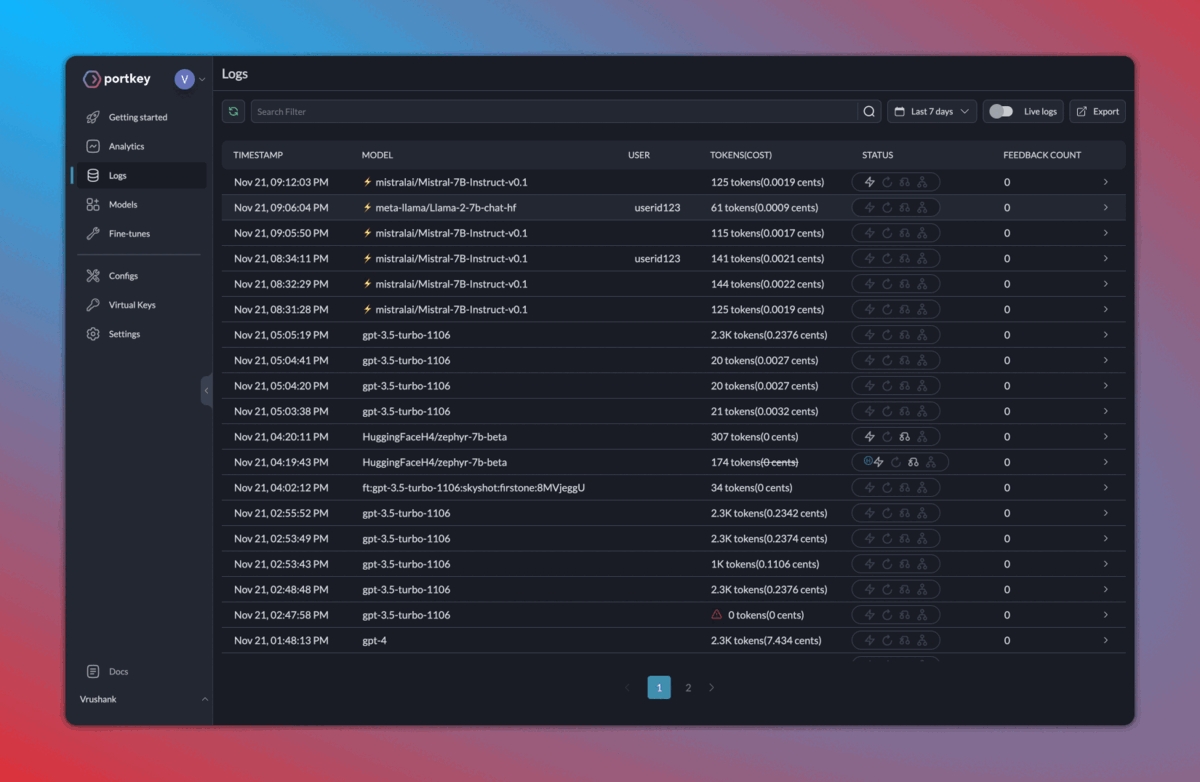Mistral
Portkey helps bring Mistral's APIs to production with its observability suite & AI Gateway. Use the Mistral API through Portkey for:
Enhanced Logging: Track API usage with detailed insights and custom segmentation.
Production Reliability: Automated fallbacks, load balancing, retries, time outs, and caching.
Continuous Improvement: Collect and apply user feedback.
1.1 Setup & Logging
Obtain your Portkey API Key.
Set
$ export PORTKEY_API_KEY=PORTKEY_API_KEYSet
$ export MISTRAL_API_KEY=MISTRAL_API_KEYpip install portkey-aiornpm i portkey-ai
""" OPENAI PYTHON SDK """
from portkey_ai import Portkey
portkey = Portkey(
api_key="PORTKEY_API_KEY",
# ************************************
provider="mistral-ai",
Authorization="Bearer MISTRAL_API_KEY"
# ************************************
)
response = portkey.chat.completions.create(
model="mistral-tiny",
messages = [{ "role": "user", "content": "c'est la vie" }]
)import Portkey from 'portkey-ai';
const portkey = new Portkey({
apiKey: "PORTKEY_API_KEY",
// ***********************************
provider: "mistral-ai",
Authorization: "Bearer MISTRAL_API_KEH"
// ***********************************
})
async function main(){
const response = await portkey.chat.completions.create({
model: "mistral-tiny",
messages: [{ role: 'user', content: "c'est la vie" }]
});
}
main()1.2. Enhanced Observability
Trace requests with single id.
Append custom tags for request segmenting & in-depth analysis.
Just add their relevant headers to your request:
from portkey_ai import Portkey
portkey = Portkey(
api_key="PORTKEY_API_KEY",
provider="mistral-ai",
Authorization="Bearer MISTRAL_API_KEY"
)
response = portkey.with_options(
# ************************************
trace_id="ux5a7",
metadata={"user": "john_doe"}
# ************************************
).chat.completions.create(
model="mistral-tiny",
messages = [{ "role": "user", "content": "c'est la vie" }]
)import Portkey from 'portkey-ai';
const portkey = new Portkey({
apiKey: "PORTKEY_API_KEY",
provider: "mistral-ai",
Authorization: "Bearer MISTRAL_API_KEH"
})
async function main(){
const response = await portkey.chat.completions.create({
model: "mistral-tiny",
messages: [{ role: 'user', content: "c'est la vie" }]
},{
// ***********************************
traceID: "ux5a7",
metadata: {"user": "john_doe"}
});
}
main()Here’s how your logs will appear on your Portkey dashboard:

2. Caching, Fallbacks, Load Balancing
Fallbacks: Ensure your application remains functional even if a primary service fails.
Load Balancing: Efficiently distribute incoming requests among multiple models.
Semantic Caching: Reduce costs and latency by intelligently caching results.
Toggle these features by saving Configs (from the Portkey dashboard > Configs tab).
If we want to enable semantic caching + fallback from Mistral-Medium to Mistral-Tiny, your Portkey config would look like this:
{
"cache": {"mode": "semantic"},
"strategy": {"mode": "fallback"},
"targets": [
{
"provider": "mistral-ai", "api_key": "...",
"override_params": {"model": "mistral-medium"}
},
{
"provider": "mistral-ai", "api_key": "...",
"override_params": {"model": "mistral-tiny"}
}
]
}Now, just set the Config ID while instantiating Portkey:
""" OPENAI PYTHON SDK """
from portkey_ai import Portkey
portkey = Portkey(
api_key="PORTKEY_API_KEY",
# ************************************
config="pp-mistral-cache-xx"
# ************************************
)
response = portkey.chat.completions.create(
model="mistral-tiny",
messages = [{ "role": "user", "content": "c'est la vie" }]
)import Portkey from 'portkey-ai';
const portkey = new Portkey({
apiKey: "PORTKEY_API_KEY",
// ***********************************
config: "pp-mistral-cache-xx"
// ***********************************
})
async function main(){
const response = await portkey.chat.completions.create({
model: "mistral-tiny",
messages: [{ role: 'user', content: "c'est la vie" }]
});
}
main()For more on Configs and other gateway feature like Load Balancing, check out the docs.
3. Collect Feedback
Gather weighted feedback from users and improve your app:
from portkey import Portkey
portkey = Portkey(
api_key="PORTKEY_API_KEY"
)
def send_feedback():
portkey.feedback.create(
'trace_id'= 'REQUEST_TRACE_ID',
'value'= 0 # For thumbs down
)
send_feedback()import Portkey from 'portkey-ai';
const portkey = new Portkey({
apiKey: "PORTKEY_API_KEY"
});
const sendFeedback = async () => {
await portkey.feedback.create({
traceID: "REQUEST_TRACE_ID",
value: 1 // For thumbs up
});
}
await sendFeedback();Conclusion
Integrating Portkey with Mistral helps you build resilient LLM apps from the get-go. With features like semantic caching, observability, load balancing, feedback, and fallbacks, you can ensure optimal performance and continuous improvement.
Read full Portkey docs here. | Reach out to the Portkey team.
Last updated
Was this helpful?